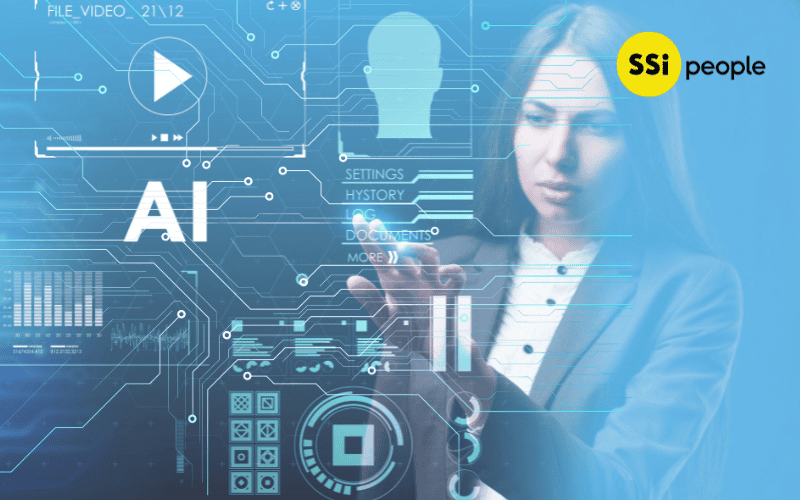Technology in 2025 continues to evolve at a rapid pace, shaping our world in ways that were once the realm of science fiction.
Here are some key tech trends in 2025, along with the types of jobs and skills needed to drive these innovations that the IT professionals should be prepared for:
1. Agentic AI
Agentic AI refers to autonomous machine “agents” that can perform tasks independently without human intervention. This trend includes applications like self-driving cars, robotic process automation, and virtual assistants. Companies are realizing an average of $3.50 in return for every dollar invested in AI. With this high ROI, investment in AI and the staff with the skillset to manage AI will only continue to grow. However, for the staffing industry, the impact will be on streamlining recruitment processes. Many of these processes will save time and manual effort, such as:
- Automated Candidate Sourcing & Matching: AI agents can autonomously search for and identify potential candidates from various online platforms. Once identified, algorithms can more accurately match job seekers with job openings, improving the quality of matches and reducing the time to hire.
- Chatbots and Virtual Recruiters: AI-powered chatbots and virtual recruiters can manage initial candidate interactions, answer questions, and schedule interviews, freeing human recruiters to focus on more strategic tasks.
- Resume Screening: AI can quickly scan and evaluate resumes, identifying the most relevant candidates based on predefined criteria, which speeds up the screening process and potentially reduces bias.
In addition to these tasks, Agentic AI can schedule interviews, assist with onboarding, and support performance monitoring through dashboards. These tasks bring efficiency and accuracy to the staffing process, improving time and work to hire. IT recruiting and staffing experts will pivot to address these new demands, also taking into account regulatory and compliance issues that arise. Working with a tech staffing firm will benefit many organizations because of compliance oversight and the agility to secure specialized talent for emerging skills. Evolving staffing firms are already working with their experts on the skills they need to oversee Agentic AI and use it appropriately.
The need for reskilling IT consultants leads to the jobs and skills needed in 2025. While AI and robotic engineers, as well as machine learning specialists, are all essential to program and “train” AI, other tech-specific jobs will include:
2. Job Skills and Training Needs in 2025
- Cybersecurity Professionals: This group will include those who protect sensitive data and the company’s critical infrastructure and identify and fix any system weaknesses. Zero-trust architecture is fast becoming a necessity, requiring organizations to verify every user and device. In addition to cloud security, workers must now be trained on cyber security safety tips to accommodate more remote and hybrid workers.
- Virtual Specialists: These professionals include those who manage remote and hybrid teams to ensure productivity and facilitate meetings and collaboration. In addition to these specialists, there will be an increase in demand for IT Support specialists to provide technical support for the current IT departments.
- HR Technologists: Specialists in integrating technology into human resources processes.
In addition to the technology-savvy workers and upskilling, there is also a shift to skills-based hiring. This shift is projected to increase. Many states have moved to this mode of skill-based hiring, with laws enacted for Federal jobs to prioritize skills and years of work experience instead of degrees or higher education. These skill-based jobs for the staffing industry staff will include the need to have knowledgeable staff to access candidates:
3. Skills-Based Jobs:
- Skills Assessors: Professionals who evaluate candidates based on specific skills rather than degrees.
- Talent Acquisition Specialists: Experts in sourcing and recruiting candidates with in-demand skills.
Perhaps most important is how to remain sustainable in your organization in the fast-paced world of today’s industry. The sustainability coordinator plays a crucial role in helping your company with this.
Sustainability Coordinators
This is a professional who develops and implements sustainability initiatives within organizations. Their role is to help navigate the evolving landscape of environmental regulations, enhance their employer brand, attract and retain talent, achieve cost savings, support Environmental, Social, and Governance (ESG) goals, and drive innovation. Their expertise is essential for ensuring the organization remains sustainable and competitive in 2025 and beyond.
All of these technical, skills – and people-based roles are essential for IT staffing to flourish in 2025. These tech trends require diverse skills and expertise, and staffing agencies, such as SSi People, continue to anticipate and adapt to the evolving tech landscape to meet the demands of modern businesses. By focusing on these areas, IT staffing providers will better support their clients and stay competitive in 2025.

